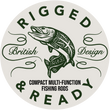Spinning Fishing Rods - Versatile, Compact, and Built for UK Anglers
If you fish in the UK, chances are you’ve owned or used a spinning rod at some point. They’re the all-rounders of the fishing world — simple to use, reliable, and able to handle everything from flicking tiny lures for perch to chucking metal off the rocks for pollock. Pair that with Rigged and Ready’s compact spinning rod travel design and you’ve got a rod that doesn’t just fish well, it fits into your life. Stick one in the boot of your car, throw it in a rucksack, or take it abroad. Wherever you end up, you’ll always be ready to fish.
What Are Spinning Fishing Rods?
A spinning fishing rod is used with either a fixed spool reel or a baitcaster, this setup makes casting smooth and fuss-free, even for beginners.
The big eyes (or guides) near the reel let the line flow off easily, meaning you can cast light lures further than you’d expect. They’re comfortable, versatile, and popular in the UK because they cover so many bases.
Whether you’re fishing soft plastics for perch by a sunken tree, spinning for trout on a reservoir, or surface lures fishing for bass, a decent spinning rod gives you control and confidence.
Things to Consider When Choosing Your Spinning Rod
Choosing a spinning rod isn’t complicated, but it does depend on what you’re actually going to do with it. Are you chasing small perch on the canal? Casting for sea bass from the rocks? Or maybe mixing a bit of everything? The answer will steer you toward the right setup.
If you mostly fish smaller waters — canals, drains, rivers — a shorter spin rod is handy. It’s easier to work with, especially where casting space is tight, and you get more accuracy close in. Head to a big open lake or the coast, though, and a longer rod suddenly makes sense. You’ll need that extra length to chuck heavier lures a good distance and to keep control of fish in deeper water.
Do Spinning Rods Need a Baitcasting Reel?
This one trips people up. “Spinning” is about the lures, not the reel — spinners, soft plastics, small jigs and the like. Most UK anglers team a spinning rod with a fixed spool reel because it’s simple, reliable, and handles light lures beautifully. You can use a baitcaster, but only if the rod’s built for it. The guides are spaced differently, the reel seat’s set up another way. The Predator Max is a cracking option because it’ll take both — fixed spool or baitcaster — so you can fish however you like. For ultralight lure work, especially LRF, the Fish Rig 180 with a small fixed spool reel is hard to beat. And if you’re fishing gnarly ground, do yourself a favour and go weedless — you’ll lose fewer lures and keep your line in the water longer.
Tips for Getting the Best from Your Spinning Rod
· Rinse it down with fresh water after saltwater trips — corrosion kills gear fast.
· Match your reel and line to the rod’s rating for the best balance.
· Longer rods = better distance. Shorter rods = better control.
· Don’t overload the rod — stick within its lure weight range.
· Keep an eye on guides and reel seats, swap them if they’re worn.
· Use a rod tube or sleeve when travelling — it saves a lot of breakages.
· Casting takes practice. A bit of time in the field makes a huge difference.
· Weedless rigs are your friend in rough ground.
· For versatility, the Predator Max is spot on. For lightweight lure fishing, grab the Fish Rig 180.
Why Choose Rigged and Ready Spinning Rods UK?
Plenty of spinning rods UK work well, but few are built to travel the way Rigged and Ready rods are. These aren’t clunky two-piece rods — they’re multi-section designs that fold down small enough to pack in a bag, yet still perform like a full-sized setup. The Predator Max gives you proper flexibility, letting you fish with a fixed spool or a baitcaster on the same rod. The Fish Rig 180 is perfect for those who enjoy ultralight sport with small lures. Add fast UK delivery, a solid warranty, and the peace of mind that comes from using rods designed with portability in mind, and you’ve got kit that’s ready for whatever the UK (or beyond) throws at you.
Shop Spinning Rods with Rigged and Ready
Rigged and Ready spinning rods bring together compact design, versatile performance, and UK-based support. From light lure setups to rods that let you swap between fixed spool and baitcasting, there’s something for every angler.
Browse our full collection of spinning rods today and find the one that suits your style.
Spinning Rods FAQs
What are spinning rods used for?
They’re used for casting lures or bait with a spinning reel. In the UK, that covers perch, trout, pike, sea bass, and pollock. They’re versatile, easy to use, and suit both freshwater and saltwater.
What is the best spinning rod?
It depends on how and where you fish. The Predator Max is ideal if you want a rod that can take both fixed spool and baitcasting reels. If ultralight spinning’s more your style, the Fish Rig 180 is built for it.
Are spinning rods better than casting rods?
Not better, just different. Spinning rods are easier to pick up and use, especially for light lures. Casting rods give you more control once you’ve got the knack, but most UK anglers stick with spinning rods for their flexibility.
What are the different types of spinning rods?
They come in different lengths, powers, actions, fixed spool reels or bait casting reels. Light rods are perfect for perch or trout, while medium to heavy rods suit bass and pollock. The compact fishing spin rod design from Rigged and Ready add portability to the mix.
How to tell if a rod is a spinning rod?
Check the reel seat and guides. A spinning rod has a reel mounted underneath, with big guides at the bottom to let line flow easily off the reel. They usually have a comfortable handle and a softer tip for working lures.
Can you cast with a spinning rod?
Of course you can — that’s the whole point of them. Pair your spinning rod with the correct reel and you’ll find it easy, whether you're using light or heavy lures. The more time you spend with it, the better your distance and accuracy will get.
How to choose the right spinning rod?
This really comes down to what you will be fishing for, what lures you'll be using and where you'll be fishing. On a canal or river chasing perch or trout, a light rod feels lively and makes every fish a scrap. Out on the coast after bass or pollock, you’ll want something sturdier that gives you more pulling power.











